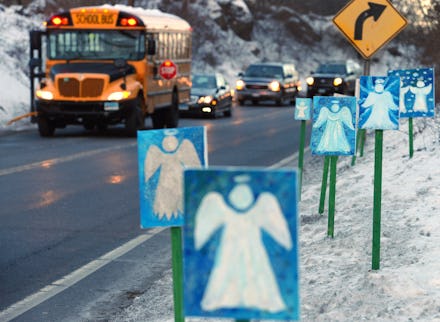Three Years After the Sandy Hook Shooting, How Have Gun Laws Changed?

It has been three years since Adam Lanza forced his way into Sandy Hook Elementary School in Newtown, Connecticut and opened fire, killing 20 students and six teachers before taking his own life. The Dec. 14, 2012 attack proved a catalyst for increased gun control, with President Barack Obama stressing the need "to come together and take meaningful action to prevent more tragedies" like it. But now, as the Associated Press reports, that trend has flipped: "many states have moved in the opposite direction, embracing the National Rifle Association's axiom that more 'good guys with guns' are needed to deter mass shootings," according to the AP's study of state gun laws in the wake of the Sandy Hook shooting.
"We've gone from, 'You can't even say that out loud' to it being an evenly divided issue, with the pro-gun side having an advantage on that," David Kopel, an Independence Institute expert on gun policy, told the AP. "I would expect that we will see continued movement on that in the coming year."
The NRA's argument: Following Sandy Hook, the NRA's Executive Vice President, Wayne LaPierre, summarized the association's stance on mass shootings in a press conference. The NRA proposed fighting fire with fire: placing armed guards in schools to protect students from gun-wielding intruders, an argument that's gaining traction nationwide as shootings at schools, churches, and government buildings lend credence to Kopel's idea that "gun-free zones are magnets for bad guys." Indiana and Mississippi have both upped the number of police officers stationed in schools, according to the AP's review.
The AP reports that concealed-carry permits for handguns have rocketed from 4.7 million to 12.8 million between 2007 and 2014. Kansas, Georgia, Tennessee and Arkansas have expanded their conceal-and-carry laws, and while six states have instituted more in-depth background checks, others have "passed reciprocity agreements recognizing gun permits approved by other states, reduced permitting fees and loosened requirements," making guns easier to acquire.
The issue of gun control has become a question of states' rights, with certain red states adopting legislation designed to circumvent gun restrictions. "States have prohibited authorities from seizing guns during emergencies, moved to ban the use of taxpayer funding for government gun buyback programs and banned the destruction of firearms seized by law enforcement," according to the AP.
Gun control facing upward battle: With every additional incident, the president reiterates the need for stricter policies to promote gun safety, naming gun control the "top issue" of his last year in the Oval Office. According to the AP, President Obama is preparing an executive order "that would expand background checks on gun sales without congressional approval" and close the "gun show loophole." And last week, the U.S. Supreme Court declined to hear a case that would challenge Chicago's ban on assault weapons.
But efforts to check the Second Amendment have so far been largely frustrated: In 2013, Congress rejected the president's 23-point gun control plan, which would have made a criminal background check obligatory for each and every gun sold, rendered the purchase of assault weapons illegal, increased funding for tracking of national gun violence statistics and strengthened mental health programs, among many other initiatives to rein in gun violence.
Newtown families have also met little success when it comes to the courts. In 2014, 10 of them filed a lawsuit against Bushmaster Firearms, the manufacturer of Lanza's assault rifle, for wrongful death. The lawsuit was rejected by the federal court and returned to the state court in October.
What Sandy Hook changed: Since Sandy Hook, the Daily News reports, gun sales have made America's four largest firearm peddlers $632 million. In 2015 alone, the U.S. has seen more than 350 mass shootings. The Dec. 2 attack on the Inland Regional Center in San Bernardino is the most recent example, following close on the heels of Robert Lewis Dear's Nov. 27 attack on a Colorado Springs Planned Parenthood.
The Newtown Action alliance, a group "dedicated to reversing the escalating gun violence epidemic in this nation through the introduction of smarter, safer gun laws and broader cultural change" identifies universal background checks as one way Washington can prevent history from continuing to repeat itself. While President Obama's initiative would be a step in that direction, its viability will likely rest on the outcome of the 2016 election.